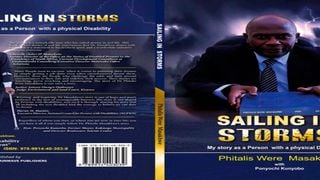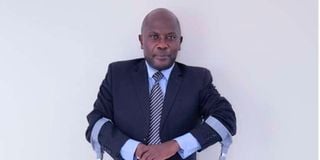
The cover page of the book ‘Sailing in Storms’ by Phitalis Were Masakwe.
| PoolWeekend
Premium
Dr Masakhwe’s stormy sailing is a unique challenge to all of us
What you need to know:
- A supportive society is one of the three main points that Dr Masakhwe highlights in his book.
- The author proposes that persons with disabilities themselves have a central role and responsibility in their own emancipation.
Phitalis Were Masakhwe, PhD, was born in October 1968. That was seven months after I graduated with a reasonably good first degree from the University of East Africa. Now, several decades later, Dr Masakhwe has just published an absorbing autobiography, Sailing in Storms (Brainwave Publishers). Of my own life story, I am yet to write the first page!
There, then, is the tale of two men, the younger one with a story worth writing and the other, well, still searching for a story to write. My friend and especially inspiring intellectual interlocutor, Prof Henry Indangasi of UoN, is the undisputed authority on biography and autobiography in our community. I would love to hear, again, his opinion about what makes a person’s life story worth telling.
In my own case, I think one reason why I have not written about my life is that I am too busy enjoying it, enjoying myself, savouring the love and friendship of my comrades and relishing the delicious titbits I share with them. With such abundance and indulgence around me, what need is there for me to be telling long tales of joy or longing? That is an elaborate but sincere way of admitting that I am lazy.
Luckily, Dr Masakhwe is neither lazy nor self-indulgent. His autobiography narrates and reflects persuasively on his adventurous and arduous journey from abject poverty, a childhood polio attack and a host of other hurdles to the top of academic echelons and solid recognition as a leading voice of disability rights advocacy.
The narrator faced not only the challenges of lifelong disability, like having to walk considerable distances to school on improvised crutches, but also the economic straits of lacking school fees at crucial stages of his education.
He recalls his family’s dependence on the meagre earnings of his father, who toiled at jobs like domestic service and at one time sugarcane cutting on the famous Mumias sugar estates. But he acknowledges with warm appreciation the generous support and encouragement of perceptive neighbours and local leaders, many of them now sadly but gloriously departed.

Phitalis Were Masakhwe, author of the biography ‘Sailing in Storms.’
Among these he singles out the late Dr Elon Willis Wameyo, the memorably good-humoured gentleman, who was for many years an area MP and Assistant Minister of Health. Dr Wameyo supported Masakhwe with school fees through several years of his high school at Musingu Boys. He would certainly be proud of his protégé today.
Indeed, a supportive society is one of the three main points that Dr Masakhwe highlights in his book. The author suggests that, given the right supportive environment, disabled people can, and do, achieve as much as any other individuals.
This reminded me of a proposition I put to you in this column, just about this time of year in 2019, that “disability enabled is ability enhanced.” You will have to read Sailing in Storms to decide whether I am reading the text accurately or seeing more in it than what the author intended.
Secondly, Dr Masakhwe emphasizes the crucial point that empowering disabled people and cooperating with them is not “sympathy” or “charity” but a simple logical step in economic and social management. Properly and adequately educated and trained disabled people become active producers and contributors to social and economic activity, assets, instead of liabilities as ill-informed people would like to regard them. Dr Masakhwe can hold himself up as a shining example in this regard.
Thirdly and most importantly, Dr Masakhwe proposes that persons with disabilities themselves have a central role and responsibility in their own emancipation. They should focus on their innate talents and potential and work around them for their own self-development, instead of succumbing to the negative stereotyping and stigmatization around them.
Rightful place in society
“In my view,” he told me in one of our exchanges, “society owes them nothing simply because they are disabled.” This reminded me of my former students at KU, strikingly high achievers, like Mr Samuel Tororey, with whom I lost contact after he visited me in Kampala some years ago, and the gospel star and literature teacher, Mary Atieno. Another, visually challenged, Kenyatta alumnus is Mr Reuben Kigame, the music and communication maestro, of whom and from whom I am sure we shall be hearing quite a lot in the near future.
This brings me to my take on the disabled people’s asserting themselves and claiming their rightful place in society. A great deal of education and sensitization of the general public is needed on the reality, even “inevitability”, of disability in society. We are all, literally, candidates for various forms of disability, and our concern about it, and our sensible inclusion in the mainstream of those who are already affected, is not an option but a must.
In this process, the disabled people must take the lead, to reorient themselves and the rest of society, as Dr Masakhwe does. Equally importantly, the disabled people, like any other disadvantaged section of society, must systematically assert and demand their rights in every aspect of social undertaking. Indeed, that is where my conversation with Dr Masakhwe started, even before I got acquainted with his autobiography.
He liked my suggestions, when I was writing, in May, about the Makerere women’s equity struggle, that we should move from affirmative action to assertive action, which comprises confidence, clarity and control. This has probably been best expressed by a distinguished lady, also with KU connections, for whom I have the highest admiration and deepest respect, Hon Senator Dr Gertrude Inimah Musuruve. Dr Musuruve, as you know, became disabled, in adult life, following an elaborate operation necessitated by a dreadful malignancy that viciously attacked her bone tissue.
“We talk about issues of disability,” Senator Musuruve is quoted as saying at some point, “because we want to make sure that we are a mainstream society.”
Discourses like Dr Masakhwe’s autobiography will undoubtedly contribute to that process.
Prof Bukenya is a leading East African scholar of English and literature. [email protected]





